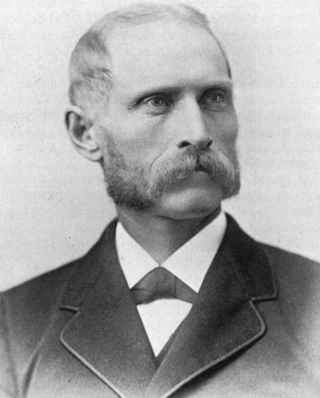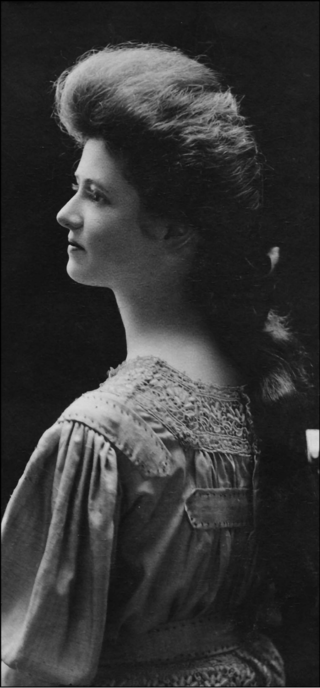
Ichthyology is the branch of zoology devoted to the study of fish, including bony fish (Osteichthyes), cartilaginous fish (Chondrichthyes), and jawless fish (Agnatha). According to FishBase, 33,400 species of fish had been described as of October 2016, with approximately 250 new species described each year.

Herpetology is a branch of zoology concerned with the study of amphibians and reptiles. Birds, which are cladistically included within Reptilia, are traditionally excluded here; the separate scientific study of birds is the subject of ornithology.

Edward Drinker Cope was an American zoologist, paleontologist, comparative anatomist, herpetologist, and ichthyologist. Born to a wealthy Quaker family, he distinguished himself as a child prodigy interested in science, publishing his first scientific paper at the age of 19. Though his father tried to raise Cope as a gentleman farmer, he eventually acquiesced to his son's scientific aspirations.

John Treadwell Nichols was an American ichthyologist and ornithologist.

Samuel Walton Garman, or "Garmann" as he sometimes styled himself, was an American naturalist and zoologist. He became noted as an ichthyologist and herpetologist.

Karl Patterson Schmidt was an American herpetologist.
The American Society of Ichthyologists and Herpetologists (ASIH) is an international learned society devoted to the scientific studies of ichthyology and herpetology. The primary emphases of the society are to increase knowledge about these organisms, to communicate that knowledge through publications, conferences, and other methods, and to encourage and support young scientists who will make future advances in these fields. The programs of the American Society of Ichthyologists and Herpetologists are part of a global effort to interpret, understand, and conserve the Earth's natural diversity and to contribute to the wise use of natural resources for the long-term benefit of humankind.

Helen Beulah Thompson Gaige was an American herpetologist, curator of Reptiles and Amphibians for the Museum of Zoology at the University of Michigan, and a specialist in neotropical frogs.
Norman Edouard "Kibe" Hartweg was an American herpetologist, Curator of Herpetology for the Museum of Zoology at the University of Michigan, and president of the American Society of Ichthyologists and Herpetologists. He was a specialist in the taxonomy and distribution of turtles, and is honored by having a subspecies of turtle named after him: the western spiny softshell turtle, Apalone spinifera hartwegi. He is also credited with having described several new species, including the Big Bend slider, Trachemys gaigeae, the Oaxacan patchnose snake, Salvadora intermedia, and Dunn's hognose pit viper, Porthidium dunni.
David Burton Wake was an American herpetologist. He was professor of integrative biology and Director and curator of herpetology of the Museum of Vertebrate Zoology at the University of California, Berkeley. Wake is known for his work on the biology and evolution of salamanders as well as general issues of vertebrate evolutionary biology. He has served as president of the Society for the Study of Evolution, the American Society of Naturalists, and American Society of Zoologists. He was a member of the American Association for the Advancement of Science, the Linnean Society of London, the American Academy of Arts and Sciences, the American Philosophical Society, and in 1998 was elected into the National Academy of Sciences. He was awarded the 2006 Leidy Award from the Academy of Natural Sciences of Philadelphia.
Emmett Reid Dunn was an American herpetologist and educator who worked in Panama and studied salamanders in the Eastern United States.

Theodore Wells Pietsch III is an American systematist and evolutionary biologist especially known for his studies of anglerfishes. Pietsch has described 72 species and 14 genera of fishes and published numerous scientific papers focusing on the relationships, evolutionary history, and functional morphology of teleosts, particularly deep-sea taxa. For this body of work, Pietsch was awarded the Robert H. Gibbs Jr. Memorial Award in Systematic Ichthyology by the American Society of Ichthyologists and Herpetologists in 2005. Pietsch has spent most of his career at the University of Washington in Seattle as a professor mentoring graduate students, teaching ichthyology to undergraduates, and curating the ichthyology collections of the UW Burke Museum of Natural History and Culture.
Richard George Zweifel was an American herpetologist, who classified several species in the American Southwest and in Australia, including the rattling frog. Zweifel contributed immensely to the documentation of the nowadays Aspidoscelis costatus species. Out of the eight costata subspecies, Dr. Zweifel reported and named five of them. Zweifel worked at the American Museum of Natural History from 1954 to 1989, and was Herpetology Department Chairman from 1968 to 1980.
Richard Bruce Bury, a pioneer in the study of herpetofauna, is an American conservationist, herpetologist, and natural historian and Scientist Emeritus of the United States Geological Survey. Bury, C. Kenneth Dodd, Jr. and Gary Fellers were the first to suggest widespread amphibian declines were progressing. In 1972, Bury became the first person hired by the United States Department of the Interior under the specific title of Herpetologist. In 2009, the American Society of Ichthyologists and Herpetologists (ASIH) made Bury the 11th herpetologist awarded the annual Henry S. Fitch Award for Excellence in Herpetology. Bury is a founding governing board member and executive editor of the journal Herpetological Conservation and Biology. For more than 30 years, Bury has studied herpetofauna ecology and conservation, including the effects of invasive species and wildfire on populations. Thanks in part to his efforts, herpetofauna are recognized as important indicators of ecosystem health.
C. Kenneth Dodd Jr., is an American herpetologist and conservationist. He earned his Ph.D. under Edmund D. Brodie Jr. from Clemson University in 1974. From 1976 to 1984 he worked in the research division of the U.S. Fish and Wildlife Service, then he transferred to the U.S. Geological Survey in 1984, where he remained until his retirement in 2007. He is currently Courtesy Associate Professor in the Department of Wildlife Ecology and Conservation, University of Florida and an Affiliate of the Florida Museum of Natural History. He has published over 200 papers, reviews and books. Much of his research focuses on turtle and amphibian ecology/conservation. He, along with R. Bruce Bury and Garry Fellers were the first to suggest widespread amphibian declines were progressing. He is a nationally recognized herpetologist.
Marvalee Hendricks Wake is an American zoologist and professor at the University of California, Berkeley, known for her research in the biology of caecilians and vertebrate development and evolution. A 1988 Guggenheim Fellow, she has served as president of the American Institute of Biological Sciences, the American Society of Ichthyologists and Herpetologists, Society for Integrative and Comparative Biology, International Union of Biological Sciences, and the International Society of Vertebrate Morphology. She is a fellow of the American Association for the Advancement of Science and the California Academy of Sciences, and is a member of the American Academy of Arts and Sciences.

Mary Cynthia Dickerson was an American herpetologist and the first curator of herpetology at the American Museum of Natural History, as well as the first curator in the now defunct department of Woods and Forestry. For ten years she was the editor of The American Museum Journal, which was renamed Natural History during her editorship. She published two books: Moths and Butterflies (1901) and The Frog Book (1906) as well as numerous popular and scientific articles. She described over 20 species of reptiles and is commemorated in the scientific names of four lizards.

Luiz Alves Rocha is the Curator and Follett Chair of Ichthyology at the California Academy of Sciences. He is also an adjunct professor at the University of California Santa Cruz and San Francisco State University.
Clark Hubbs was an American ichthyologist who was professor of zoology at the University of Texas from 1963 until he accepted emeritus status in 1991. He was a leading figure in ichthyology in Texas, teaching students who went on to be renowned in the field, was involved in ichthyological societies and was an editor of scientific journals. Hubbs was also an environmental activist, fighting to conserve freshwater ecosystems.
Margaret "Meg" McBride Stewart was an American herpetologist, known for her research on the amphibians of Malawi, the Caribbean, and the United States. She was a professor at the State University of New York at Albany. She served as president of the American Society of Ichthyologists and Herpetologists and the Society for the Study of Amphibians and Reptiles. The puddle frog Phrynobatrachus stewartae was named in her honour.










